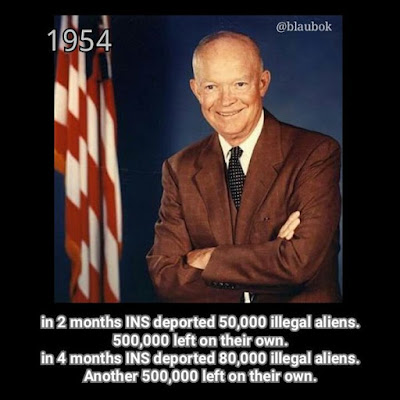Operation Wetback...see how Caesar Chavez celebrated its use
1952 Immigration and Nationality Act, a.k.a. the McCarran-Walter Act (An act to revise the laws relating to immigration, naturalization, and nationality; and for other purposes)
H.R. 13342; Pub.L. 414; 182 Stat. 66.
82nd Congress; June 27, 1952.
SUMMARY
Otherwise
known as the McCarran-Walter Act, the Immigration and Nationality Act
of 1952 was meant to exclude certain immigrants from immigrating to
America, post World War II and in the early Cold War. The
McCarran-Walter Act moved away from excluding immigrants based simply
upon country of origin. Instead it focused upon denying immigrants who
were unlawful, immoral, diseased in any way, politically radical etc.
and accepting those who were willing and able to assimilate into the US
economic, social, and political structures, which restructured how
immigration law was handled. Furthermore, the most notable exclusions
were anyone even remotely associated with communism which in the early
days of the Cold War was seen as a serious threat to US democracy. The
main objective of this was to block any spread of communism from outside
post WWII countries, as well as deny any enemies of the US during WWII
such as Japan and favor “good Asian” countries such as China. The
McCarran-Walter Act was a strong reinforcement in immigration selection,
which was labeled the best way to preserve national security and
national interests. President Truman originally vetoed the law, deeming
it discriminatory; however there was enough support in Congress for the
law to pass.
REVISED?
The 1965 act
marked a radical break from the immigration policies of the past. The
law as it stood then excluded Asians and Africans and preferred northern
and western Europeans over southern and eastern ones.[2] At the height
of the civil rights movement of the 1960s the law was seen as an
embarrassment by, among others, President John F. Kennedy, who called
the then-quota-system "nearly intolerable".[3] After Kennedy's
assassination, President Lyndon Johnson signed the bill at the foot of
the Statue of Liberty as a symbolic foothold of signing the bill.
In order to
convince the American people of the legislation's merits, its proponents
assured that passage would not influence America's culture
significantly. President Johnson called the bill "not a revolutionary
bill. It does not affect the lives of millions",[4] while Secretary of
State Dean Rusk and other politicians, including Senator Ted Kennedy,
hastened to reassure the populace that the demographic mix would not be
affected; these assertions would later prove grossly inaccurate.[5]
 m
m
























































No comments:
Post a Comment